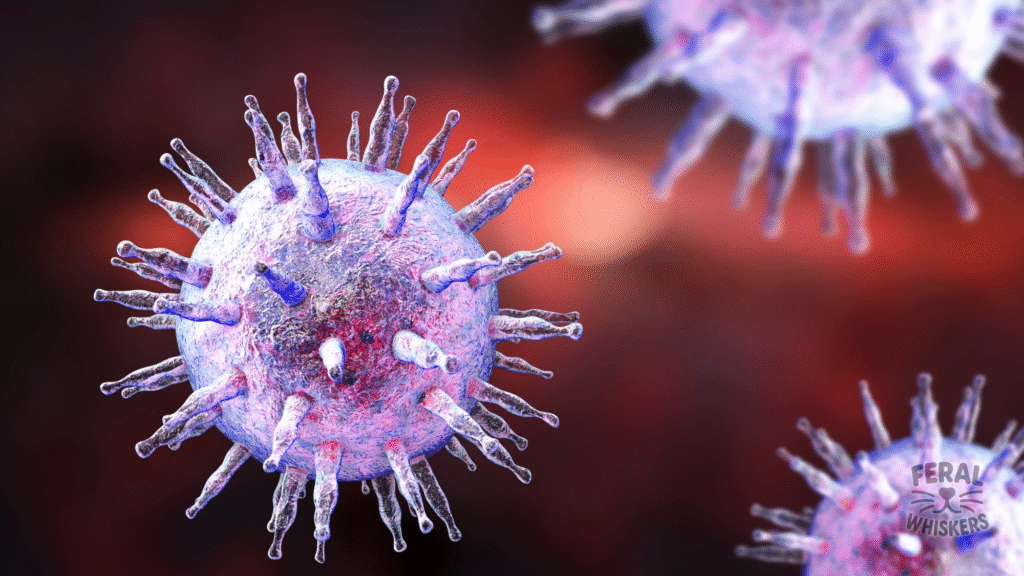
Feline Herpesvirus‑1 (FHV‑1) is one of the most common viral infections in cats and a major cause of “cat flu.” Once a cat is infected, the virus stays in its system for life, often hiding silently until stress or illness triggers a flare‑up. While rarely fatal in healthy adult cats, herpesvirus can be very serious in kittens, senior cats, or immune‑compromised pets.
📌 What is Feline Herpesvirus (FHV‑1)?
FHV‑1 is a viral infection closely related to human herpes viruses (but species‑specific, so humans are safe). It causes upper respiratory and eye infections in cats. After the initial infection, the virus usually goes dormant in the nervous system, re‑emerging during times of stress or illness.
It is one of the two primary “cat flu” viruses, alongside feline calicivirus (FCV).
🦠 How FHV‑1 Spreads
FHV spreads very easily, especially in multi‑cat environments:
- Direct contact – through eye, nose, or mouth secretions.
- Shared resources – food bowls, litter boxes, bedding.
- Human vectors – owners can carry the virus on hands, clothes, or shoes.
Virus survival: FHV survives only a few hours in the environment but spreads quickly with direct contact. This makes quarantine and hygiene extremely important.
🚨 Symptoms of Feline Herpesvirus Infection
Most visible signs appear in the upper respiratory system:
- Frequent sneezing fits 🤧
- Eye infections (conjunctivitis) – red, swollen, watery or pus‑filled eyes 👀
- Nasal discharge (clear or green/yellow mucus) 👃
- Corneal ulcers – painful sores on the surface of the eyes
- Excessive blinking or squinting due to discomfort
- Nasal congestion → difficulty breathing
- Fever 🌡️
- Lethargy 💤
- Loss of appetite 🍽️ (due to smelling problems or discomfort)
Chronic carriers may develop ongoing eye problems and flare‑ups throughout life.
🔍 Diagnosis of FHV
A vet can often diagnose FHV based on symptoms, especially when eye involvement is severe. Confirmatory tests may include:
- PCR swabs from the eyes or nasal passages.
- Fluorescein eye stain to highlight corneal ulcers.
- Bloodwork to rule out other illnesses.
💊 Treatment of FHV in Cats
There is no permanent cure for herpesvirus—treatment focuses on reducing flare‑up severity and managing symptoms.
1. Supportive Care:
- Fluids (IV or Sub‑Q) if the cat is dehydrated.
- Assisted feeding if appetite drops dangerously.
2. Medications:
- Antiviral therapy (famciclovir) – significantly reduces flare‑up severity.
- Antibiotics – prescribed if secondary bacterial infection occurs.
- Eye drops/ointments – may contain antivirals (cidofovir, idoxuridine) or antibiotics.
- Anti‑inflammatory drops to reduce swelling in the eyes (vet prescribed).
- L‑lysine supplements – sometimes used to help suppress viral replication, though results vary.
⚠️ Warning: Never use human cold/flu medication or painkillers for cats—they can be toxic or fatal. Always follow veterinary direction.
🥣 Diet for Cats with FHV
During flare‑ups, appetite can drop because of nasal congestion and eye discomfort. To help:
- Offer warm, soft, aromatic foods (canned cat food warmed slightly, tuna in water, boiled chicken).
- Encourage hydration with fresh water and wet food.
- Pureed meat‑only baby food (no onion/garlic) may entice reluctant eaters.
- Syringe feeding or feeding tubes may be necessary in severe cases.
🏡 Home Care for Cats with FHV
- Isolation during flare‑ups to protect other cats.
- Humidified air—use a humidifier or place cat in a steamy bathroom to relieve congestion.
- Clean eyes and nose gently with warm, damp cotton pads.
- Disinfect bowls and litter boxes daily.
- Provide a stress‑free environment (use pheromone diffusers, provide hiding spots). Stress is the #1 trigger of herpes flare‑ups.
🛡️ Prevention of FHV
- Vaccination: FHV is part of the FVRCP core vaccine. Vaccinated cats may still get infected, but symptoms are usually much milder.
- Quarantine new cats for at least 2 weeks before introduction.
- Practice good hygiene in multi‑cat homes—wash hands and separate bowls.
- Reduce stress (consistent feeding, litter hygiene, stable environment).
🌱 Quality of Life with FHV
- Once infected, cats carry the virus for life.
- Most affected cats lead long, normal lives if flare‑ups are managed.
- Some may have chronic eye or nasal issues requiring ongoing care.
- Reducing stress, feeding well, and keeping vaccinations up to date dramatically improve quality of life.
❓ FAQs About Feline Herpesvirus
1. Can humans or dogs catch feline herpesvirus?
No—FHV only infects cats, but humans can spread it between cats indirectly.
2. Do vaccinated cats still get herpesvirus?
Yes, but usually with milder symptoms and faster recovery. Vaccination protects against severe illness.
3. Is FHV fatal?
Rarely in adults, but kittens or immune‑compromised cats can die from severe cases or complications.
4. Can cats recover completely from herpesvirus?
They recover from symptoms but remain carriers for life. Flare‑ups may happen periodically.
5. What triggers flare‑ups in chronic carriers?
Stress is the biggest factor: moving homes, new pets, vet visits, or illness can all activate viral shedding.
💡 Final Thoughts
Feline Herpesvirus (FHV) is common and often lifelong, but with proper care, cats can thrive. Regular vet visits, vaccination, stress reduction, and supportive care during flare‑ups are the keys to giving your cat the best life possible.
✅ Key takeaway: FHV is not a death sentence. With love, patience, and vet guidance, most cats live happily—even as carriers.
